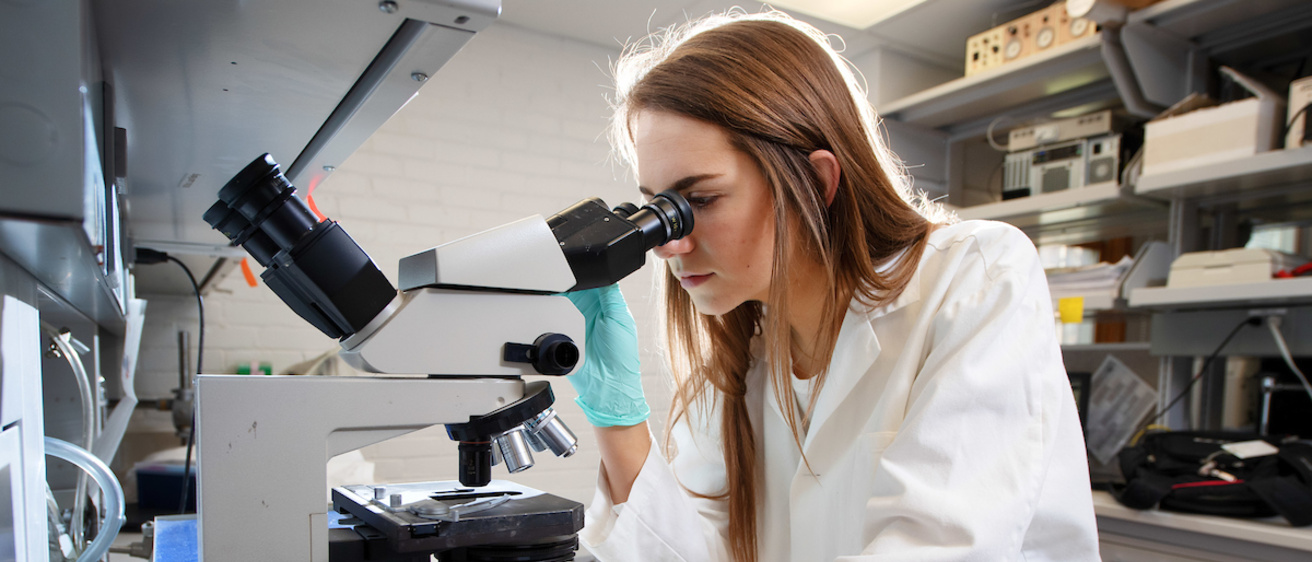Undergraduate students at the University of Iowa not only have plentiful opportunities to work alongside faculty researchers, they make important contributions to science.
Story: Sara Epstein Moninger
Photography: Justin Torner and Tim Schoon
Published: June 9, 2022
The top photo...
University of Iowa students can start their research journey their first year on campus, and they aren’t limited to projects in their major area of study. About one in three undergraduate students at Iowa participates in research.
Noah Gilkes had long been fascinated by science but didn’t quite understand what research entailed until he enrolled at the University of Iowa.
“I thought I was just going to go to college and do my major. Research never really came to mind because nobody ever put it in my mind. But I got to Iowa and it was explained to me,” says Gilkes, a neuroscience and philosophy major from Robins, Iowa. “At first, I thought it would be a ton of extra work, but then I realized that you could do it for credit or be paid or both — and that it would compound what I was learning in class.”
Many of his fellow undergraduates have had their own impactful research experiences on the UI campus—here’s a sampling:
- An economics major scrutinized opioid deaths and made a surprising discovery.
- A biomedical sciences major explored neural circuitry hoping to develop individualized therapies for depression and decided to pursue an advanced degree in public health.
- A speech and hearing science major used an eye-tracking technique to study spoken and written word recognition in deaf adolescents who have cochlear implants.
Students who pursue this extracurricular work build valuable skill sets, enhance their coursework, and become more competitive job applicants—and they also have fun, says Bob Kirby, director of the Iowa Center for Research by Undergraduates (ICRU).
“Students involved in research tend to be excited about what they are doing. They love the people they work with and feel like they are part of a community,” Kirby says. “A lot of them find that that’s what they want to be doing—spending their time on intellectual curiosity.”
Students can get started as early as their first year, Kirby says, and they aren’t limited to projects in their major area of study.
“Certainly, the sciences are well represented at Iowa, especially the health sciences, but there is a tremendous range of fields available for students who want to do research—from 3D design and musicology to sustainability and the environment,” says Kirby, noting that some research positions are paid while others offer academic credit. “This is the time to explore ideas that excite you. You can still plan to go to medical school and do research on the environment, for example. In fact, you might find out how those two pieces fit together in a unique way.”
“This is the time to explore ideas that excite you. You can still plan to go to medical school and do research on the environment, for example. In fact, you might find out how those two pieces fit together in a unique way.”
Undergraduate participation in research also benefits faculty investigators, says Rainbo Hultman, an assistant professor of molecular physiology and biophysics who studies electrical networks in the brain. She usually has six undergraduates working in her lab at any one time and says they are essential for innovation.
“It’s important to have fresh, diverse perspectives. Sometimes an undergrad will have a question that seems naive on the surface but really is the question we need to be asking,” says Hultman. “Plus, our undergrads come with lots of energy and enthusiasm, and that helps get the research done. We can accomplish more together than any of us can alone.”
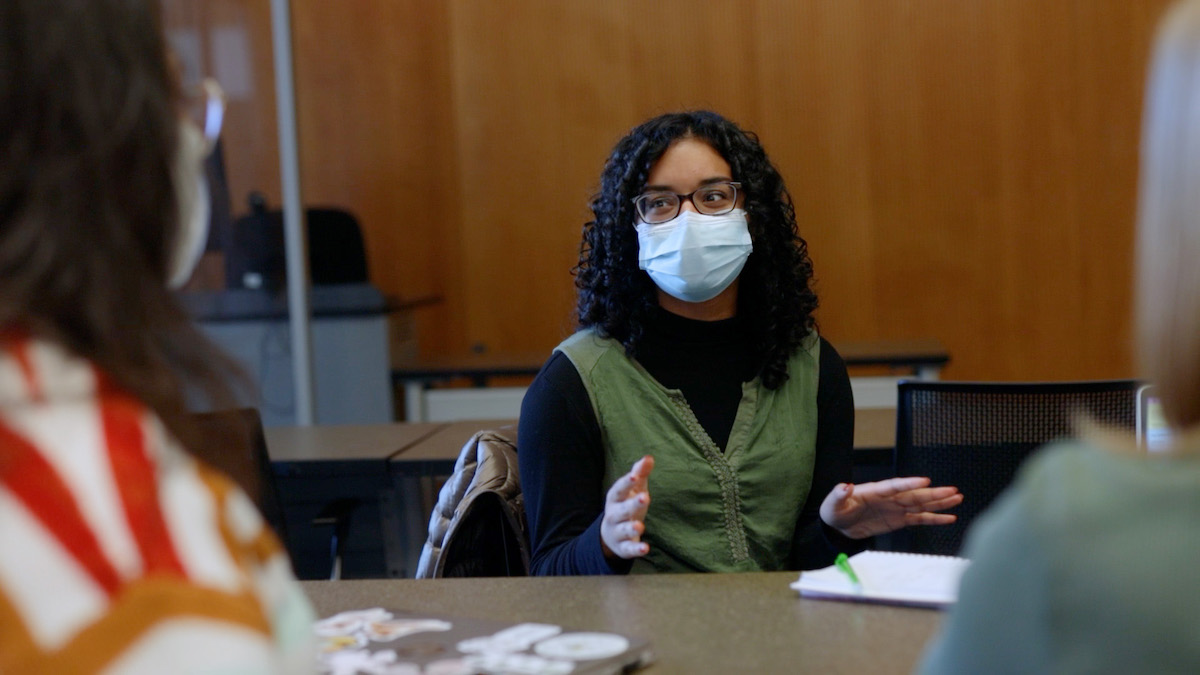
Radha Velamuri, who earned a BS in biomedical sciences in May 2022 and is a graduate student in epidemiology, works in Rainbo Hultman's lab studying neural circuitry and how brain regions interact.
From sixth grade science fair to graduate study
Winning a science fair as a sixth grader in West Des Moines, Iowa, set Radha Velamuri on a path toward discovery. In high school, she participated in the Secondary Student Training Program through the UI Belin-Blank Center and conducted research in obstetrics and gynecology, which she later presented at science fairs across the country. She knew she wanted to get involved with research as an undergraduate student at Iowa, so shortly after arriving on campus, she contacted Hultman to learn more about her work. The two spoke for more than two hours, the conversation ending with a job offer.
“I was very surprised that Dr. Hultman took me in as a freshman, because I didn’t have the foundation and I was still learning things,” says Velamuri, who earned a BS in biomedical sciences in May 2022. “The skills I developed in her lab definitely helped me better understand what I was learning in class.”
In Hultman’s lab, Velamuri studies neural circuitry and how brain regions interact. By better understanding the underlying mechanisms of depression and migraine, she says, they hope to inform the development of therapeutics.
“Every single person in research I’ve talked to is very passionate about what they are studying—I could listen to them all day. That passion draws you in. That’s probably why I don’t have a specific field chosen yet.”
“Different brain regions have specific functions,” she says. “For example, the amygdala is involved with fear, while the prefrontal cortex is involved with decision making. Neural circuitry looks at how these different brain regions interact on an electrical level. We are specifically focusing on people with depression and migraines, and an important aspect of both of these disorders is their relationship to chronic stress.”
Before graduating, Velamuri began working toward a master’s degree in epidemiology as part of the Undergrad to Grad Program in the UI College of Public Health. She intends to go to medical school and ultimately conduct clinical research. Her biggest challenge, she says, is deciding on a field.
“While I enjoy the discovery aspect of research, I also like the communication,” Velamuri says. “Every single person in research I’ve talked to is very passionate about what they are studying — I could listen to them all day. That passion draws you in. That’s probably why I don’t have a specific field chosen yet.”
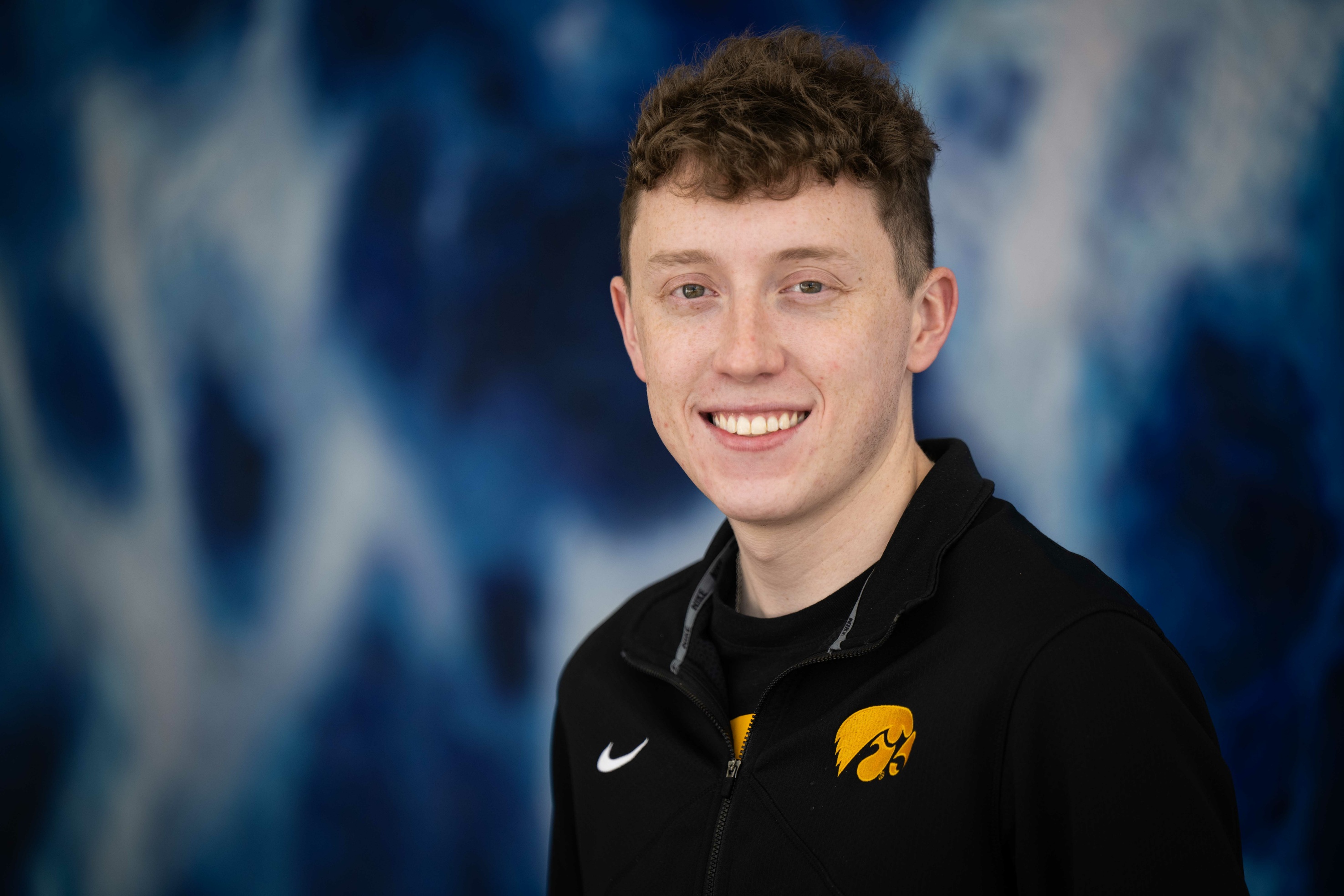
Noah Gilkes, a neuroscience and philosophy major from Robins, Iowa, works in a lab in the Iowa Neuroscience Institute.
Lab work not simply washing dishes
In his third year of undergraduate studies, Noah Gilkes is on the cusp of becoming an author on an original research publication—a result created in part by the initiative he showed during his early days as a Hawkeye.
As a first-year student, Gilkes visited the Iowa Neuroscience Institute website and was intrigued by the research of Alexander Bassuk, a pediatric neurologist studying epilepsy. Gilkes knew people with the disorder, so he reached out to Bassuk, who invited him to tour the lab. He accepted a position to work with Bassuk and later shifted to another project in the lab led by Elizabeth Newell, an assistant professor of pediatrics who studies traumatic brain injury in children.
The goal of their research, Gilkes says, is to find a way to mitigate the effects of traumatic brain injury. He says he didn’t expect the level of engagement he encountered when he started.
“I went into the work thinking, ‘I’m just a freshman. I’m going to go in, wash dishes, clean, and leave,’ but it was actually the complete opposite. I was part of the team,” says Gilkes, who logs up to 10 hours a week in the lab. “Our day-to-day work involves running experiments, and we meet as a lab once or twice a week to discuss results and talk about future plans. A lot of what we do is prepping experiments and waiting on another organization or service for analysis. That waiting gives us time to improve our scientific reading and writing skills and think about experiments we might try to replicate or expand on.”
Although being patient can be challenging, Gilkes says the effort is worth it.
“If you’ve known somebody in a really bad crash, then you know sometimes they can’t learn new things — or it’s very difficult for them,” he says. “Difficulty learning how to do new things is just one complication of brain injury. Someone who suffers from a stroke may have a hard time walking again, and may also experience other lifelong consequences as a result of brain changes. This could partially be due to the activation of the immune systems in the brain. Our research tries to target and block these immune systems from being activated after brain injury, to potentially preserve behavior and memory and learning. There’s also degeneration that happens after traumatic brain injury and cell death. Having fewer neurons firing in your brain is going to have an impact on all parts of your life, so we’re also looking at how we can stop cell death from happening in the brain.”
Gilkes tentatively plans to attend medical school, but also is interested in teaching — and he’d like to stay on the UI campus.
“What I’ve learned at Iowa goes beyond the textbook — whether it’s socially or through research,” he says. “I feel like I’m prepared not only for what the workplace might look like but also for how to act in that workplace and do my job.”
Continuing arc of discovery
Undergraduate students who get involved in research at Iowa often continue a journey toward discovery after they graduate, says pediatric neurologist Alexander Bassuk. The first undergraduate to work in his lab earned a PhD from Johns Hopkins University and won an NIH Director’s New Innovator Award, while the second one won a Graduate Research Fellowship from the National Science Foundation while in a doctoral program at Georgia Tech.
Noah Gilkes, a third-year neuroscience major currently working on a project in his lab, will be no exception, Bassuk says.
“Our undergraduate researchers are having a big impact, and Noah’s work will help us to someday discover ways to protect children from neurological damage after traumatic brain injury,” Bassuk says. “I am certain that his undergraduate research experience will meaningfully inform his work as a physician and scientist.”
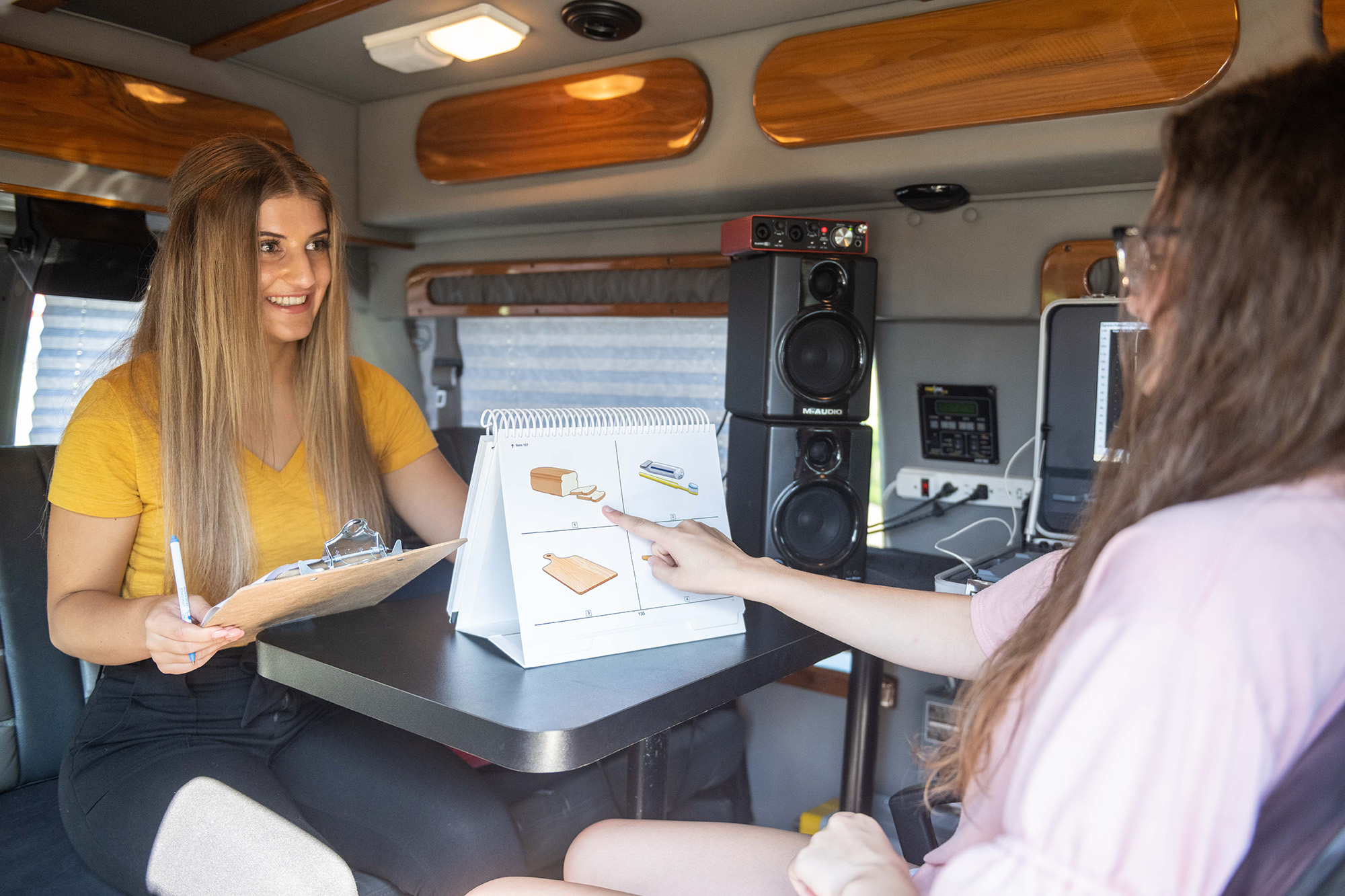
Evita Woolsey, who earned a BA in speech and hearing science in May 2022 with a minor in American Sign Language, participated in undergraduate research through the Pediatric Audiology Lab.
Research ‘unexpected part’ of education
As a speech and hearing science major, Evita Woolsey participated in research through the Pediatric Audiology Lab, but she never imagined how big a role that experience would play in her education.
“I was intimidated by research and looked at it as an aspect of those in the hard sciences,” says Woolsey, an Encinitas, California, native who earned a BA in speech and hearing science in May 2022 with a minor in American Sign Language. “Becoming involved in the Pediatric Audiology Lab changed my whole perspective on what I believed research was. It opened so many doors for me and also gave me the opportunity to do my own research project. It’s been such an unexpected part of my undergraduate experience.”
Woolsey, who will continue her education at Iowa in a master’s program for speech-language pathology, served as an undergraduate research assistant for the Pediatric Audiology Lab as well as the Cochlear Implant Language Lab. She spent time in 2021 traveling around Iowa conducting assessments of children with hearing loss in a mobile clinic as part of a research project led by Elizabeth Walker, associate professor of communication sciences and disorders and a researcher in the Pediatric Audiology Lab.
For her honors thesis, Woolsey used an eye-tracking technique to study spoken and written word recognition in deaf adolescents who have cochlear implants. The goal, she says, is to uncover the mechanisms that may underlie delays with reading and spoken-language comprehension and provide additional information to educators who instruct deaf adolescents with cochlear implants.
While speech pathology is her focus, Woolsey says her research experience has given her a newfound appreciation of audiology — and she encourages students to visit ICRU to see how their academic interests may correspond with research opportunities.
“You don’t have to be a hard-science person to be involved in research,” Woolsey says. “One of the main things that people are surprised by when they hear about these projects in speech and hearing science is how making a large impact in the field doesn’t require wearing a lab coat.”
“Becoming involved in the Pediatric Audiology Lab changed my whole perspective on what I believed research was. It opened so many doors for me… It’s been such an unexpected part of my undergraduate experience.”
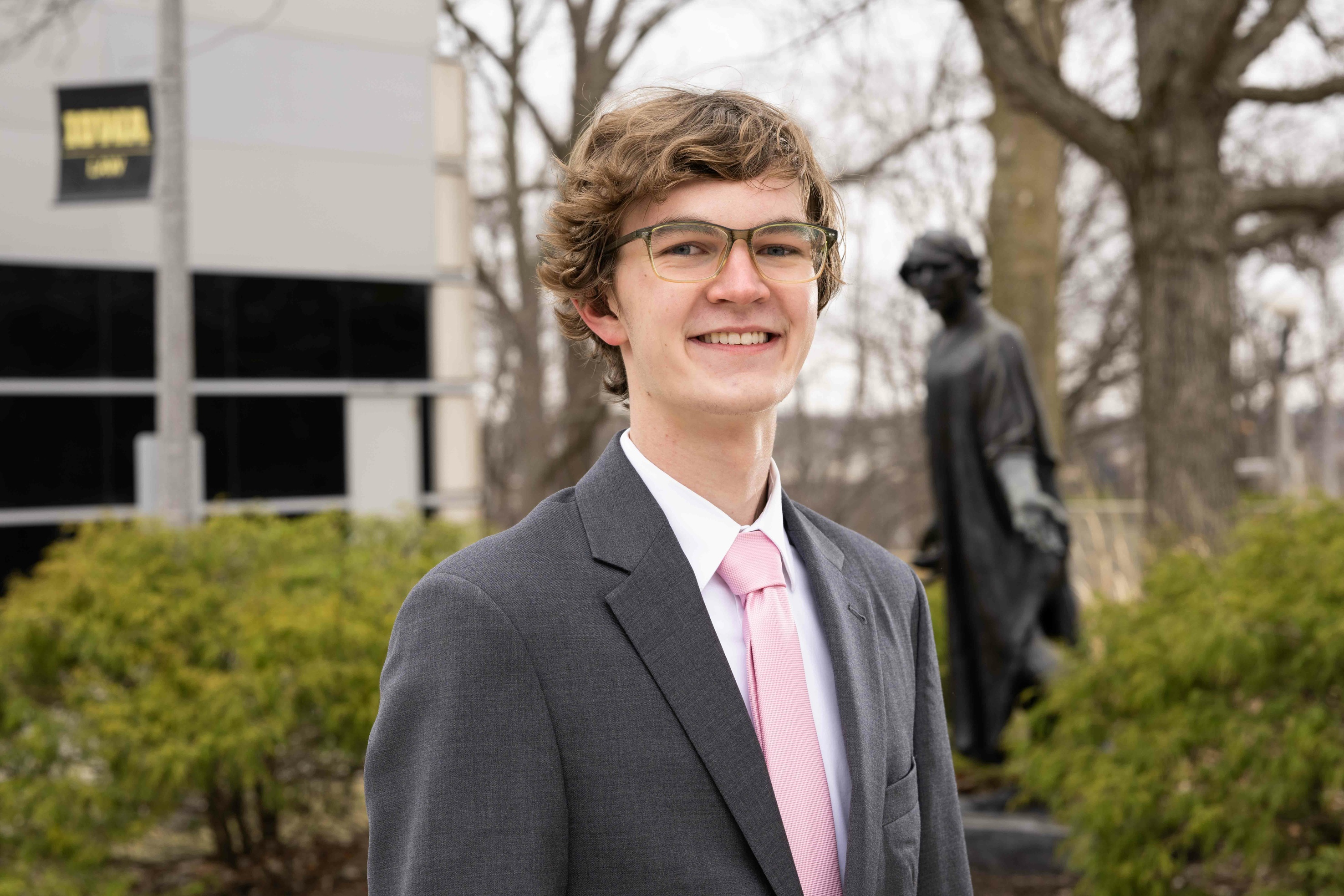
Spencer Cooper-Ohm, a second-year economics and English major from Council Bluffs, Iowa, made a surprising discovery while researching the effects of naloxone laws on opioid deaths.
Research not reserved for science majors
Spencer Cooper-Ohm, a second-year economics and English major from Council Bluffs, Iowa, plans to go to law school. Getting involved in research his first year on campus allowed him to apply the knowledge he gained in the classroom and the skills he learned as part of the UI Mock Trial team.
After taking a couple of classes from Jeffrey DeSimone, a former visiting associate professor of economics in the Tippie College of Business, Cooper-Ohm approached him about the possibility of helping on a research project.
“Professor DeSimone had a long list of research ideas that he had thought about but didn’t have time for, and gave me a choice. I picked research that looks at the effects of naloxone access laws on opioid deaths,” says Cooper-Ohm. “Naloxone is the lifesaving medicine that can reverse an opioid overdose — you can either stab it in their leg or shoot it up their nose, and the opioid is reversed. It’s a fantastic drug. In 2014, there were a couple of papers that looked at the impact of naloxone laws on opioid deaths, and they found pretty intuitively that when people are provided with access to naloxone, there tends to be fewer opioid deaths in any given state. But in 2021, Professor DeSimone ran numbers from the CDC again, trying to replicate those studies, and found that naloxone access laws actually seem to be causing opioid deaths to go up.”
Cooper-Ohm was surprised by the finding, but says it makes sense. A leading theory is that without follow-up mechanisms in place — such as treatment for withdrawal symptoms or rehabilitation — access to naloxone may be a moral hazard, and he notes Prince as an example. The pop star died of an opioid overdose in 2016, just one week after naloxone saved his life.
“What we’re doing right now is the equivalent of pointing at something and yelling, ‘This is a problem.’ In addition to naloxone access laws, we’re looking at Good Samaritan laws as well as relatively newer state laws that limit the amount of opioids a doctor can prescribe for a patient,” he says. “I have to comb through state legislatures to determine which states have which laws, and that’s a lot easier when you’ve done mock trial and have some knowledge of the law. It’s a really cool overlap of everything I’m doing in college.”
The overall experience in research, including the possibility of being a published author on a paper, is good preparation for law school, Cooper-Ohm says, and when the time to apply comes, Iowa’s law school will be on his list.
“I came here knowing that I wanted to go to law school and I kind of halfheartedly wanted to do economics. I ended up with two majors, a research position, and I’m still on the initial track that I wanted to be on,” he says. “Even if you don’t have an incredibly specialized view of what you want to do for a career, Iowa is a really great place to prepare and get experience in whatever fields you are interested in.”
“Even if you don’t have an incredibly specialized view of what you want to do for a career, Iowa is a really great place to prepare and get experience in whatever fields you are interested in.”
